#April Bleske-Rechek
Text
By: Michael Bernstein and April Bleske-Rechek
Published: Apr 17, 2023
This is a guest post by Michael Bernstein (Brown University) & April Bleske-Rechek (University of Wisconsin-Eau Claire). Michael Bernstein is an experimental psychologist and an Assistant Professor at Brown University. His research focuses on: cognitive biases, the placebo effect, pain, and substance use. He is an editor of the forthcoming book, The nocebo effect: When words make you sick.
April Bleske-Rechek is a differential and evolutionary psychologist. She is a full professor of psychology at the University of Wisconsin-Eau Claire, where she invests in mentoring undergraduate scholars and engaging students with viewpoints and data they are unlikely to be exposed to elsewhere. Her recent publications and presentations can be found on her personal website: bleske-rechek.com.
--
youtube
Let’s play a game. It’s called “Who said it: Robin DiAngelo or Adolf Hitler?” DiAngelo, in case you don’t know, is author of the NYT best-seller book, White Fragility. We’ll give you a couple quotes and you think about whether it’s from DiAngelo or Hitler. Ready, go.
1) Did Hitler say: “Not having a group consciousness, Jews often respond defensively when grouped with other Jews.” Or did DiAngelo say: “Not having a group consciousness, Whites often respond defensively when grouped with other Whites.”
2) Did Hitler say: “Jews… creep up on the workers in order to win their confidence, pretending to have compassion.” Or did DiAngelo say: “Whites… creep up on the workers in order to win their confidence, pretending to have compassion.”
For the record, the first quote is from DiAngelo and the second quote is from Hitler. Though whether you were right isn’t exactly the point, as an astute reader would probably know Hitler is likely to use the language of “workers” and DiAngelo is likely to use the language of “group consciousness”. The point is that DiAngelo and Hitler are both advocating an approach that reduces behavior to group membership. They describe the behavior of all Whites or all Jews in highly critical terms and conclude that this is the nature of Whiteness or Jewishness.

We know from decades of psychological research that people hold prejudices. But which groups in today’s society are more likely to be the target of expressions of prejudicial attitudes? And who is more likely to express them?
We decided to examine this empirically. Would agreement with the same statement, whether it be anti-White, anti-Black, or anti-Jew, vary depending on which group it referenced? And would political affiliation moderate attitudes?

We took 3 real anti-Jew quotes from Adolf Hitler, 3 real anti-White quotes from Robin DiAngelo, and 3 real anti-Black quotes from Stephen Douglas. (Douglas was a 19th century American politician who debated Abraham Lincoln). Then, we created anti-Jew, anti-White, and anti-Black variations of each quote, and showed it to 428 college graduates or college students (72% White). This means that 1/3 of participants saw the real quote verbatim, whereas the other 2/3 saw a version of the quote that was manipulated by changing the original (e.g., replace “Jew” with “White” or “Black”, or any other combination thereof). This is shown in the Table below. For each quote, participants were asked to imagine that an intellectual or political leader uttered the statement. They then indicated whether they agreed with the statement by selecting: “definitely no,” “probably no,” “probably yes,” or “definitely yes.” Participants answered this question for all nine quotes, and all were in the same frame (anti-Jew, anti-White, or anti-Black).
Table 1:
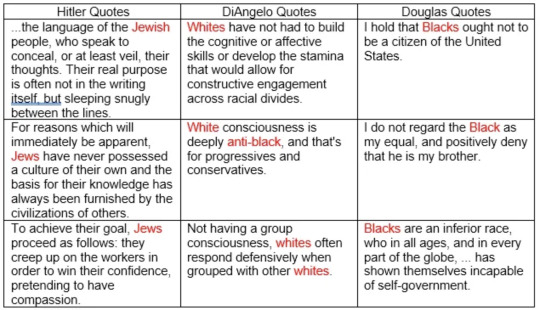
[ Red font is used to indicate the words that were manipulated across conditions. Quotes were identical otherwise. All quotes were altered to refer to either Jews, Blacks, or Whites for 1/3 of the sample. ]
The results were surprising. For 7 of the 9 quotes, agreement differed according to target group. On each of these, agreement was highest in the anti-White condition versus the anti-Jew and anti-Black condition. The figures below show the percentage of college graduates (left) and college students (right) who either “probably” or “definitely” agreed with at least one statement, broken down by target group and the original author of the quote (Hitler vs. DiAngelo vs. Douglas). You can see that agreement with both Hitler and DiAngelo is much higher in the anti-White condition versus the other two conditions. Hardly anyone agreed with the Douglas quotes regardless of target group.
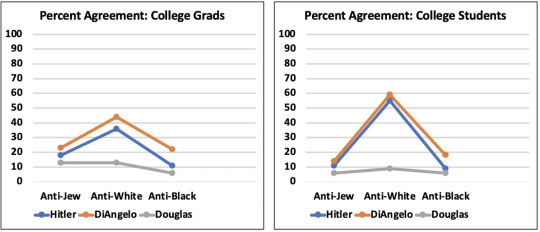
For the Hitler and DiAngelo quotes we analyzed the interaction between target group and political ideology.1 This was significant for all quotes, and we once again looked at the percentage of people who agreed with at least one of the statements, shown below. Anti-White sentiment was highest across the board – for liberals, moderates, and conservatives alike. Anti-White sentiment was the highest for liberals compared to other political groups; anti-Jew and anti-Black sentiment was highest for conservatives compared to other political groups.
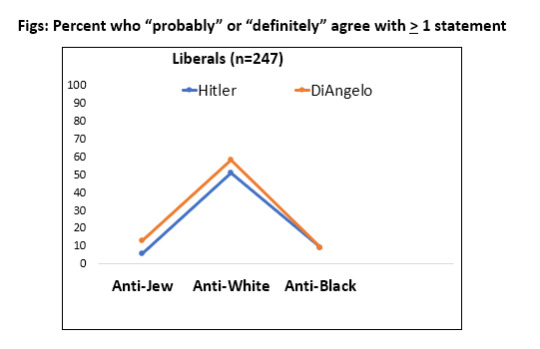
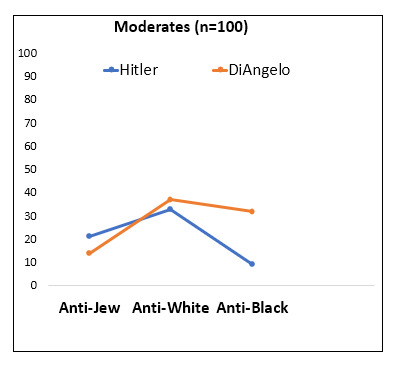
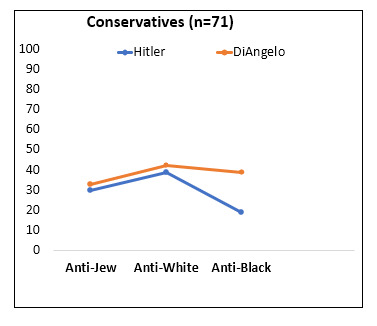
In a sense, our results are nothing new. We simply observed what has existed for millennia: People treat some groups preferentially to others. In the Bible, the Egyptian Pharoah enslaved the people of Israel. And interestingly, even God responded to this tribally by establishing Passover which “The whole community of Israel is to be included on the meal,” but “no foreigners are to eat it.”2
Sweeping claims about all members of certain demographic groups seem to be on the rise in some circles. But unless you’re tuned into a relatively small number of heterodox writers like Bari Weiss or Coleman Hughes, you will rarely hear someone speculate about the counter-factual (e.g. Bob said all Whites do X vs. Imagine if he instead said all Blacks do X).
Coleman Hughes: “It [cops killing unarmed people] only gets pumped into the media when its a Black person, which gives the false impression that it only happens to Black people.” See also this survey finding that people in general, but especially liberals, massively overestimate the number of unarmed Black people killed by police.
youtube
In the language of Richard Dawkins, tribalism and prejudice may be memes. Memes, in this context, are ideas that “propagate themselves… by leaping from brain to brain” (Dawkins, 2016; p. 249). It is easy to see how tribal loyalties evolved evolutionarily (see Clark & Winegard, 2020), though finding that a mostly White sample had anti-White sentiment cannot be attributed to in-group preferences. Indeed, 55% of college students agreed with at least one Hitler quote applied to White people. Still, there is a historical precedent for people acting negatively towards their own group. In Nazi Germany, Kapos, who were prisoners but also functioned as SS guards, were often crueler towards their fellow prisoners (and frequently fellow Jews) than the Nazis themselves.
This type of tribalism never seems to go well. Why would we expect it to benefit us now?

-
An incomplete list of disclaimers that should go without saying:
1) Nothing in our essay is meant as an argument that DiAngelo is as evil a person as Hitler, or for that matter, evil at all. Hitler is responsible for the murder of 11 million people and the death toll from just the European theater of World War II was at least 40 million. DiAngelo is not responsible for the death of anyone. But we can recognize this fact while still pointing to similarities in their thinking.
2) Just because a person agrees with a quote from Hitler does not mean that person agrees with Hitler’s genocide.
==
Never forget that the Grievance Studies probe rewrote a section of "Mein Kampf" as intersectional feminist "scholarship" and it was accepted and published.

youtube
#Michael Bernstein#April Bleske-Rechek#Adolf Hitler#Robin DiAngelo#Stephen Douglas#prejudice#bias#literally Hitler#religion is a mental illness#Youtube
12 notes
·
View notes
Text
Discussion Article November 25th
Why Are We Attracted to Our Friends?
New research reveals why we fall for friends (and fail to 'unfriend' exes)
The friends in the 90s sitcom Friends were often anything but. I lost track of how many times Ross and Rachel got together and broke up, only to hop back into the sack by the time the season finale rolled around. Then Chandler and Monica got in on the act, and didn’t Joey and Rachel knock boots for a while too? I forget. But it’s safe to say that when Phoebe finally married Ant-Man, we were all surprised. “But you’ve not been friends with him for ten years…”
Three new scientific papers reveal why even those of us who eschew sweater vests and don’t live in massive rent-controlled Manhattan apartments are sometimes prone to fall for our friends, and explain why so many of us try to remain friends with an ex.
Is it a Man Thing?
Let’s try out a little thought experiment. Think of a specific friend who identifies as a gender you find attractive.
Do you have someone in mind? OK. Now rate how attracted you are to that friend on a scale of 1–9. One means “not at all attracted”, five means “moderately attracted”, and nine means “extremely attracted”.
Research by April Bleske-Rechek, a psychologist at the University of Wisconsin-Eau Claire, shows that women rate their attraction to their male friend at an average of around four; men rate their attraction to their female friend one point higher, at around five.
Men appear to see their opposite-sex friends as possible romantic partners somewhat more than women do.
Or do they? Bleske-Rechek wondered if men and women differed in their ratings because of the type of friend they were imagining. Perhaps when you ask a woman to think of a male friend, she does just that. Men, on the other hand, might find their thoughts turning to a female acquaintance they wish was more than a friend.
In a new follow up study, Bleske-Rechek, had two research assistants approach male-female pairs of adults in a university student union. The research assistants invited the pairs to take part in a psychology experiment. Those who agreed were asked to stand apart from one another and then given a survey to complete.
The survey included questions about each volunteer’s attraction to the other person in their pair. The volunteers also reported if they and their partner were in a relationship, were just friends, or knew each other in some other capacity.
Bleske-Rechek examined the data for the pairs in which both members stated that they were friends. She found that men rated the attractiveness of their friend at around four, and women rated the attractiveness of their friend at around 3.5: a difference revealed by statistical analysis to be non-significant. In other words, men appear to be no more or less attracted to their opposite-sex friends than women are.
This suggested that Bleske-Rechek’s theory could be correct: perhaps when men are asked to think of a female friend, they don’t think of a woman they hang out with at the student union but instead of the most attractive woman they know, even if she barely qualifies as a friend.
To find out for sure if she was right, Bleske-Rechek had around 300 young men and women think of an opposite-sex friend. Then she asked those same volunteers which of two definitions fit their friend best: “A person of the opposite sex who is a friend” or “A person of the opposite-sex who I am physically attracted to.” Volunteers were free to select both definitions if they wished.
The researchers found that 42% of men, but 66% of women, chose “a friend of the opposite-sex”. Another 42% of men, but only 29% of women, chose “A person of the opposite-sex who I am physically attracted to”. As much as 17% of men, but only 5% of women, thought both definitions described their friend.
It seems Bleske-Rechek was correct: men may be more attracted to their opposite-sex friends than women are, but only when men are given a free choice of which friend to consider. Given a free choice, the first friend a man thinks of will be someone he finds alluring. Women are more likely to think of someone they have relegated to the “friend-zone”.
Escape From the Friend-Zone
Perhaps you’re lucky enough not to have heard of the friend-zone. It’s the limbo to which attractive people send us when they decide that we are definitely not partner-material. Entering the friend-zone is like passing the event horizon of a black hole: just as light cannot escape a black hole, a friend cannot escape the friend-zone.
Anyway, that’s the lay-theory. But what does the research say? If you are attracted to a friend whom you suspect has placed you firmly in the friend-zone, can you convince that friend to reconsider your suitability as a relationship partner?
That’s what Edward Lemay and Noah Wolf of the University of Maryland set out to discover.
For their first experiment, the scientists rounded up 127 pairs of platonic male-female friends. Each of these volunteers completed a series of questionnaires about their attraction to their friend, how much they felt their friend reciprocated their desire, and whether they had ever tried to initiate a romantic relationship with their friend.
article continues after advertisement
Lemay and Wolf found that the attraction between friends was detected by those friends. In other words, we can tell with a good degree of accuracy if our friend is attracted to us. Lemay and Wolf also found that those who were attracted to a friend also thought that their friend reciprocated their desire: we project our feelings onto our friends, assuming that if we like them, they must like us too. This projection effect was stronger than the accuracy effect. In short, we’re delusional.
But this delusion could be useful. If we kid ourselves into believing that our friends are attracted to us as much as we are attracted to them, we are more likely to take a chance on initiating a romantic relationship with them. A chance we may not have taken if we were more accurate in our perceptions. If we knew that our friends didn't dig us the way we dug them, then we would remain confined to the friend-zone forever.
Now, you may have spotted a flaw in this plan. If you hit on a friend who likes you less than you like them, surely they will knock you back. What’s to gain from self-delusional overconfidence?
Lemay and Wolf carried out a second experiment, this time following 102 pairs of male-female friends over the course of a month. This allowed them to follow how friends’ perceptions of one another developed over time. They found that volunteers whose friend attempted to initiate a relationship with them came to desire that friend more over time.
article continues after advertisement
As Lemay and Wolf put it:
Initially biased perceptions appeared to motivate behavior that resulted in targets [i.e. the desired friend] confirming those perceptions, the hallmark of a self-fulfilling prophecy.
So there you go: with concerted effort, you can claw your way out of the friend-zone. If you fancy your friend, and let them know it, your desire could inflame theirs and lead to a long and fulfilling relationship.
Staying Friends with an Ex
Or your relationship could crash and burn. In which case, you may hear your erstwhile partner suggest “let’s just be friends”.
But should you stay friends with an ex? And would you want to?
Justin Mogilski and Lisa Welling of the Oakland State University in Michigan decided to investigate the motivations of male-female couples to maintain their friendship after the spark has gone from their romantic relationship.
First, they asked 348 volunteers to brainstorm reasons why a person might want to remain friends with a partner after a split. The volunteers came up with a sizable list of 153 unique and specific justifications for maintaining a friendship with an ex.
0 notes